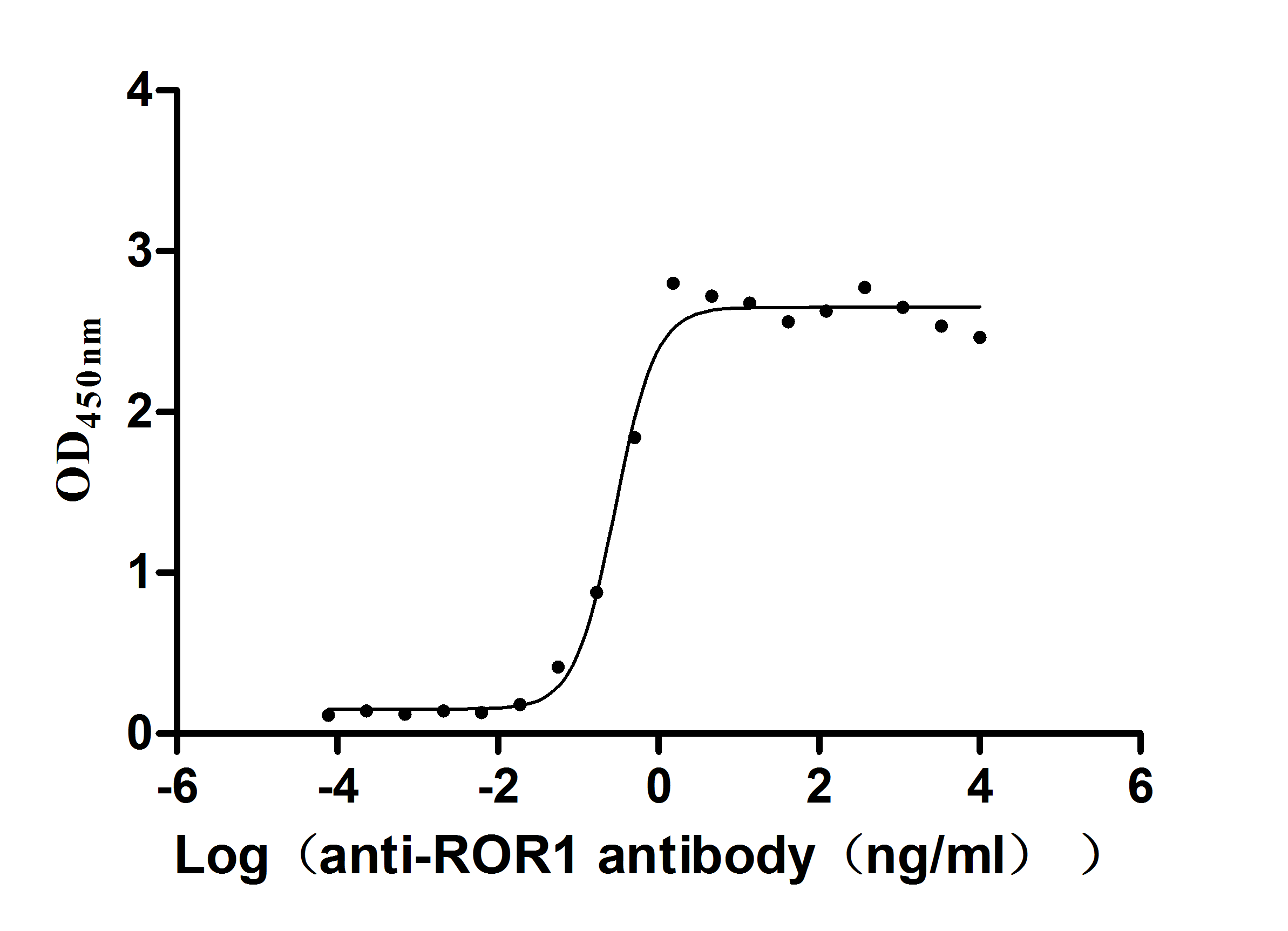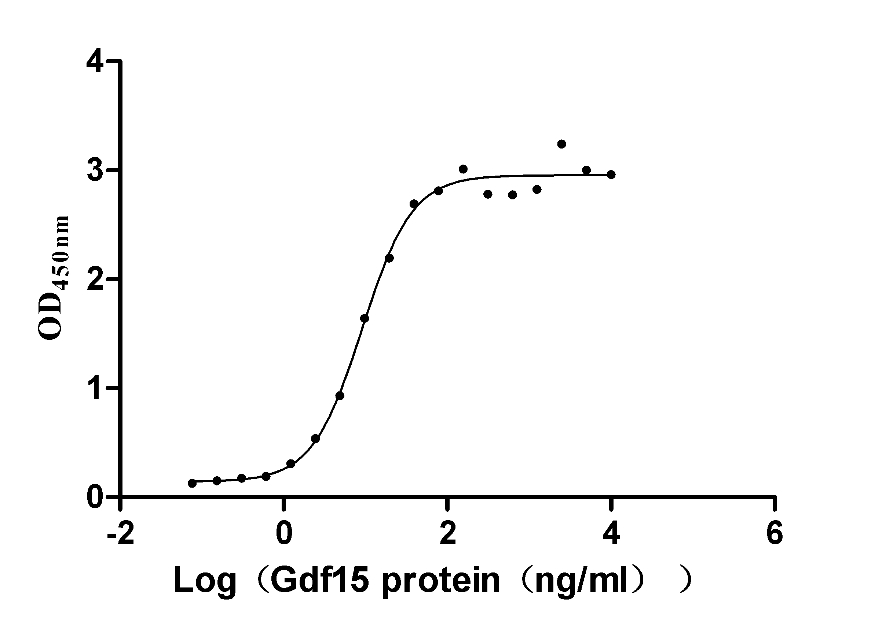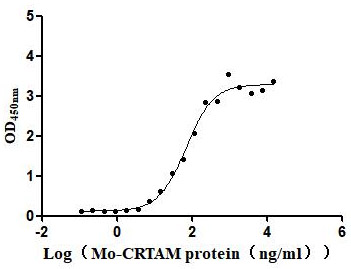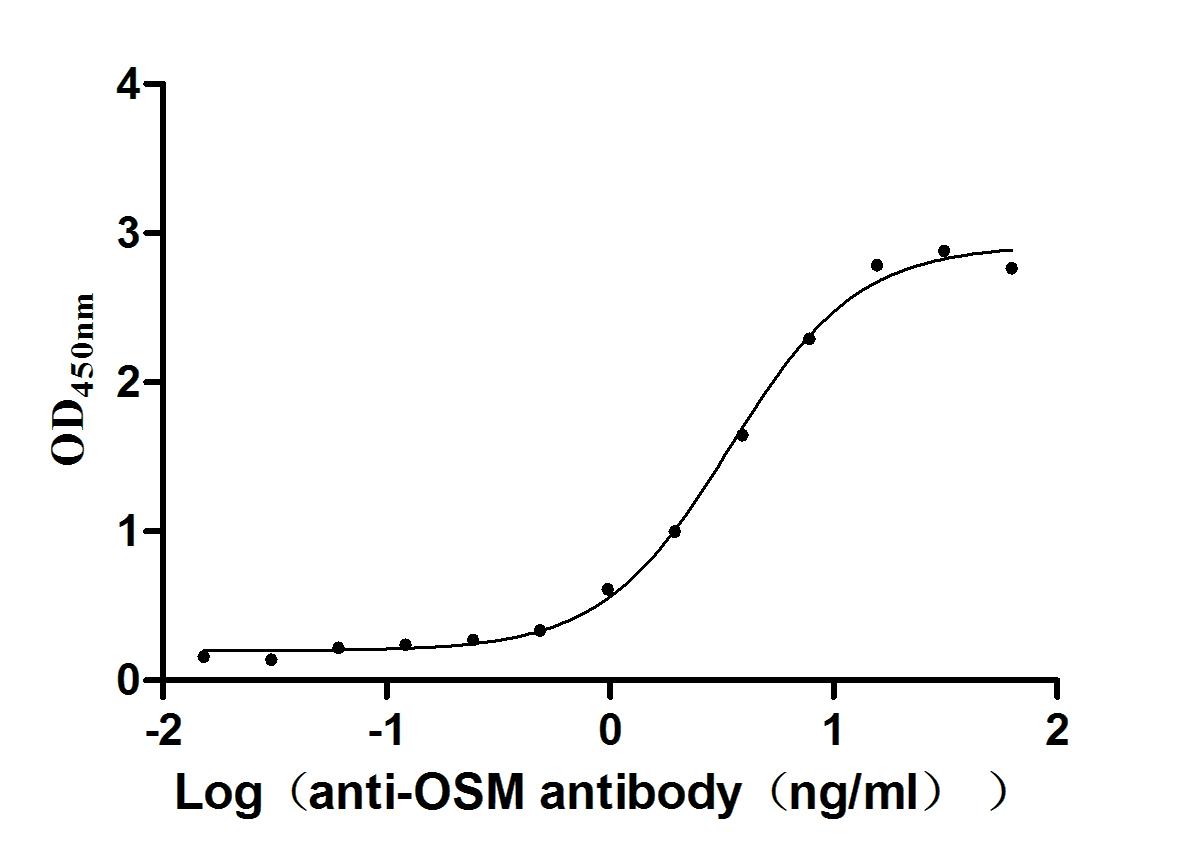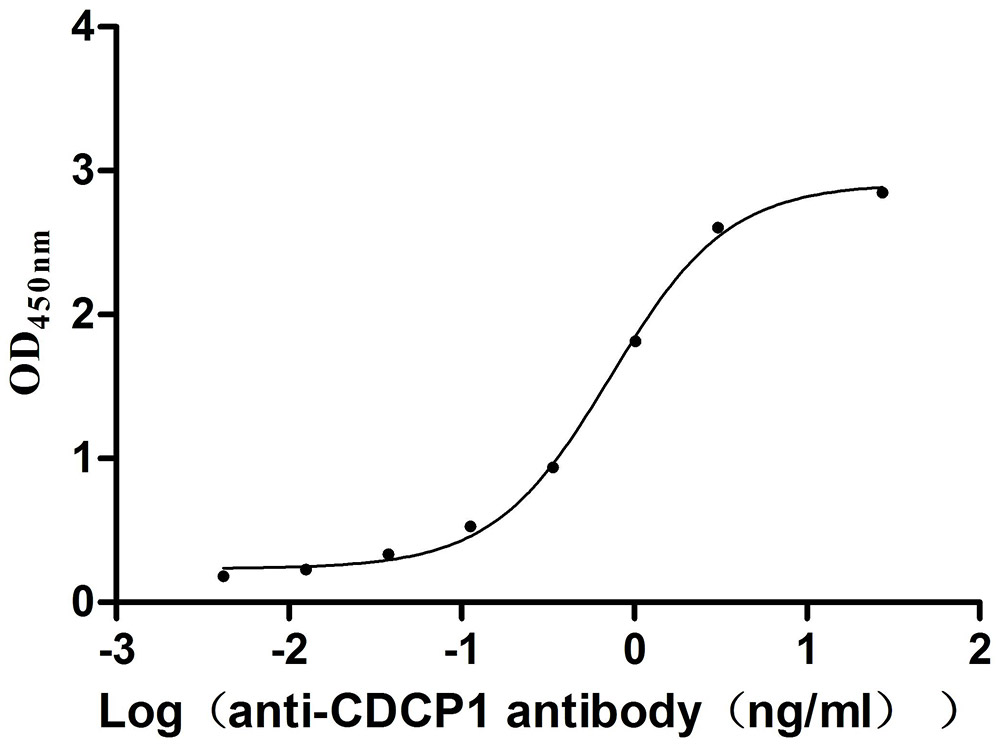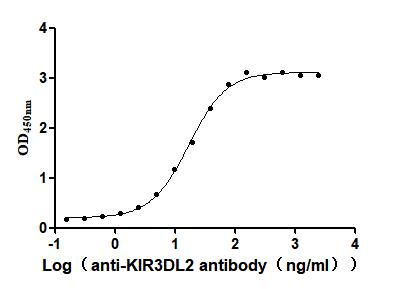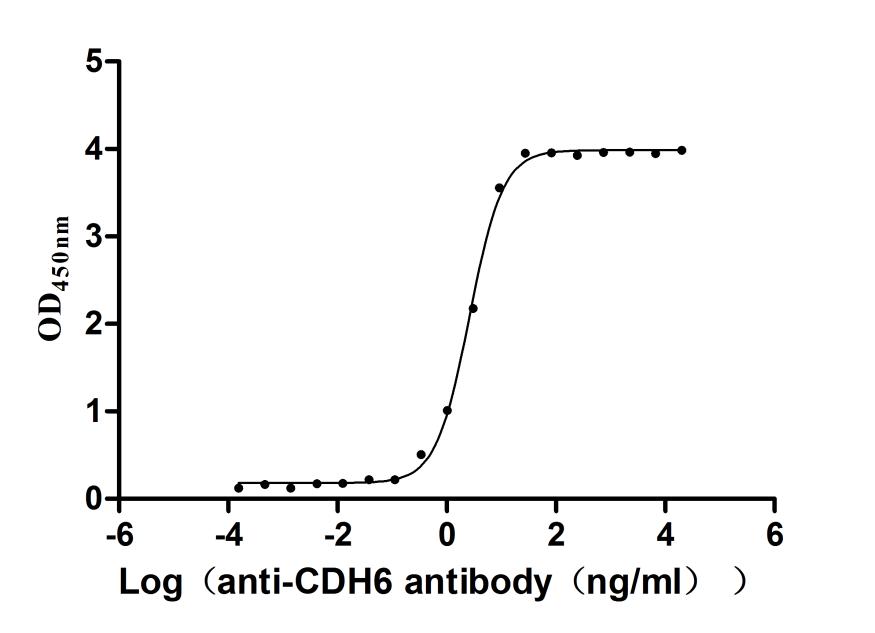Recombinant Human Phosphatidylinositol N-acetylglucosaminyltransferase subunit A (PIGA), partial
-
中文名称:人PIGA重组蛋白
-
货号:CSB-YP017965HU1
-
规格:
-
来源:Yeast
-
其他:
-
中文名称:人PIGA重组蛋白
-
货号:CSB-EP017965HU1
-
规格:
-
来源:E.coli
-
其他:
-
中文名称:人PIGA重组蛋白
-
货号:CSB-EP017965HU1-B
-
规格:
-
来源:E.coli
-
共轭:Avi-tag Biotinylated
E. coli biotin ligase (BirA) is highly specific in covalently attaching biotin to the 15 amino acid AviTag peptide. This recombinant protein was biotinylated in vivo by AviTag-BirA technology, which method is BriA catalyzes amide linkage between the biotin and the specific lysine of the AviTag.
-
其他:
-
中文名称:人PIGA重组蛋白
-
货号:CSB-BP017965HU1
-
规格:
-
来源:Baculovirus
-
其他:
-
中文名称:人PIGA重组蛋白
-
货号:CSB-MP017965HU1
-
规格:
-
来源:Mammalian cell
-
其他:
产品详情
-
纯度:>85% (SDS-PAGE)
-
基因名:PIGA
-
Uniprot No.:
-
别名:PIGA; Phosphatidylinositol N-acetylglucosaminyltransferase subunit A; GlcNAc-PI synthesis protein; Phosphatidylinositol-glycan biosynthesis class A protein; PIG-A
-
种属:Homo sapiens (Human)
-
蛋白长度:Partial
-
蛋白标签:Tag type will be determined during the manufacturing process.
The tag type will be determined during production process. If you have specified tag type, please tell us and we will develop the specified tag preferentially. -
产品提供形式:Lyophilized powder
Note: We will preferentially ship the format that we have in stock, however, if you have any special requirement for the format, please remark your requirement when placing the order, we will prepare according to your demand. -
复溶:We recommend that this vial be briefly centrifuged prior to opening to bring the contents to the bottom. Please reconstitute protein in deionized sterile water to a concentration of 0.1-1.0 mg/mL.We recommend to add 5-50% of glycerol (final concentration) and aliquot for long-term storage at -20℃/-80℃. Our default final concentration of glycerol is 50%. Customers could use it as reference.
-
储存条件:Store at -20°C/-80°C upon receipt, aliquoting is necessary for mutiple use. Avoid repeated freeze-thaw cycles.
-
保质期:The shelf life is related to many factors, storage state, buffer ingredients, storage temperature and the stability of the protein itself.
Generally, the shelf life of liquid form is 6 months at -20°C/-80°C. The shelf life of lyophilized form is 12 months at -20°C/-80°C. -
货期:Delivery time may differ from different purchasing way or location, please kindly consult your local distributors for specific delivery time.Note: All of our proteins are default shipped with normal blue ice packs, if you request to ship with dry ice, please communicate with us in advance and extra fees will be charged.
-
注意事项:Repeated freezing and thawing is not recommended. Store working aliquots at 4°C for up to one week.
-
Datasheet :Please contact us to get it.
相关产品
靶点详情
-
功能:Catalytic subunit of the glycosylphosphatidylinositol-N-acetylglucosaminyltransferase (GPI-GnT) complex that catalyzes the transfer of N-acetylglucosamine from UDP-N-acetylglucosamine to phosphatidylinositol and participates in the first step of GPI biosynthesis.
-
基因功能参考文献:
- A likely pathogenic variant putatively affecting splicing of PIGA identified in a multiple congenital anomalies hypotonia-seizures syndrome 2 (MCAHS2) family pedigree via whole-exome sequencing. PMID: 29974678
- The study established a human induced pluripotent stem cell (hiPSC) model containing the PIGAc.1234C>T mutation to study the effects of a hypomorphic allele of PIGA on neuronal development. Neuronal differentiation from neural progenitor cells generated by embryoid bodie formation in PIGAc.1234C>T is significantly impaired with decreased proliferation, aberrant synapse formation and abnormal membrane depolarization. PMID: 28441409
- Pig-a MFs as measured by the RBC Pig-a assay for the ENU-treated group increased in a time-dependent manner with the maximum value at week 4; however, those using the PIGRET assay reached comparable values at week 1 PMID: 27931808
- A recurrent germline mutation in the PIGA gene causes Simpson-Golabi-Behmel syndrome type 2. PMID: 26545172
- This case reports on a new missense PIGA germline mutation in a Chinese male infant presenting with developmental arrest and multisystemic disorders. PMID: 25885527
- the PIGA mutation in this family likely causes a reduction in GPI anchor protein cell surface expression in various cell types, resulting in the observed pleiotropic phenotype involving central nervous system, skin, and iron metabolism. PMID: 24259288
- Our data strongly suggest that the early frameshift mutation in PIGA produces a truncated hypomorph, which is sufficient to rescue the lethality in males but not the MCAHS2-like phenotype. PMID: 24357517
- The results of this study confirmed that PIGA mutations are one genetic cause of early-onset epileptic encephalopathies, suggesting that GPI-anchor deficiencies may be an underlying cause of EOEE. PMID: 24706016
- The small population of PIG-A mutant cells in myelodysplastic syndromes do not arise from multipotent hematopoietic stem cells. PMID: 22315493
- An X chromosome exome next-generation sequencing screen identified a single nonsense PIGA mutation. PMID: 22305531
- loss of PIG-A or a combination of genes within the 0.5 Mb commonly deleted region leads to a phenotype capable of avoiding immune surveillance, but is not inherently malignant. PMID: 21116280
- the PIG-A mutations in paroxysmal nocturnal hemoglobinuria patients PMID: 15625823
- Molecular testing for mutations in the PIG-A gene can serve as a confirmation test of paroxysmal nocturnal hemoglobinuria. PMID: 12037021
- Decreased susceptibility of leukemic cells with PIG-A mutation to natural killer cells in vitro allows paroxysmal nocturnal hemoglobinuria clones to escape immune attack. PMID: 12130519
- PIG-A gene abnormality in precursor cells and changes of expression of GPI-anchored protein and contribution of paroxysmal nocturnal hemoglobinuria clones with PIG-A gene abnormalities among various cell lineages during differentiation and maturation PMID: 12411324
- The spectrum of PIG-A gene mutations in aplastic anemia/paroxysmal nocturnal hemoglobinuria reveals a high incidence of multiple mutations and evidence of a mutational hot spot. PMID: 12424196
- PIG-A mutations are relatively common in normal hematopoiesis PMID: 15687243
- review of the clinical and biological relevance of PIG-A mutations in paroxysmal nocturnal hemoglobinuria, aplastic anemia and healthy controls [review] PMID: 16923549
- In patients with paroxysmal nocturnal hemoglobinuria, it is very unlikely that more than one PIG-A mutated clone arises at the level of the hematopoietic stem cells. PMID: 17823237
- PIG-A mutations contribute to clonal expansion in PNH by conferring a survival advantage to hematopoietic progenitors under proapoptotic stresses. PMID: 19013003
- Paroxysmal nocturnal hemoglobinuria is an acquired hemolytic anemia caused by the expansion of a hematopoietic progenitor cell that has acquired a mutation in the X-linked PIGA gene. PMID: 19074066
显示更多
收起更多
-
相关疾病:Paroxysmal nocturnal hemoglobinuria 1 (PNH1); Multiple congenital anomalies-hypotonia-seizures syndrome 2 (MCAHS2)
-
亚细胞定位:Endoplasmic reticulum membrane; Single-pass membrane protein.
-
蛋白家族:Glycosyltransferase group 1 family, Glycosyltransferase 4 subfamily
-
数据库链接:
HGNC: 8957
OMIM: 300818
KEGG: hsa:5277
STRING: 9606.ENSP00000369820
UniGene: Hs.137154
Most popular with customers
-
Recombinant Human Leukemia inhibitory factor (LIF) (Active)
Express system: Mammalian cell
Species: Homo sapiens (Human)
-
Express system: Mammalian cell
Species: Homo sapiens (Human)
-
Recombinant Mouse GDNF family receptor alpha-like (Gfral), partial (Active)
Express system: Mammalian cell
Species: Mus musculus (Mouse)
-
Recombinant Mouse Cell adhesion molecule 1 (Cadm1), partial (Active)
Express system: Mammalian cell
Species: Mus musculus (Mouse)
-
Recombinant Human Oncostatin-M (OSM), partial (Active)
Express system: Mammalian cell
Species: Homo sapiens (Human)
-
Recombinant Mouse CUB domain-containing protein 1 (Cdcp1), partial (Active)
Express system: Mammalian cell
Species: Mus musculus (Mouse)
-
Recombinant Human Killer cell immunoglobulin-like receptor 3DL2 (KIR3DL2), partial (Active)
Express system: Mammalian cell
Species: Homo sapiens (Human)
-
Recombinant Human Cadherin-6(CDH6),partial (Active)
Express system: Mammalian cell
Species: Homo sapiens (Human)



